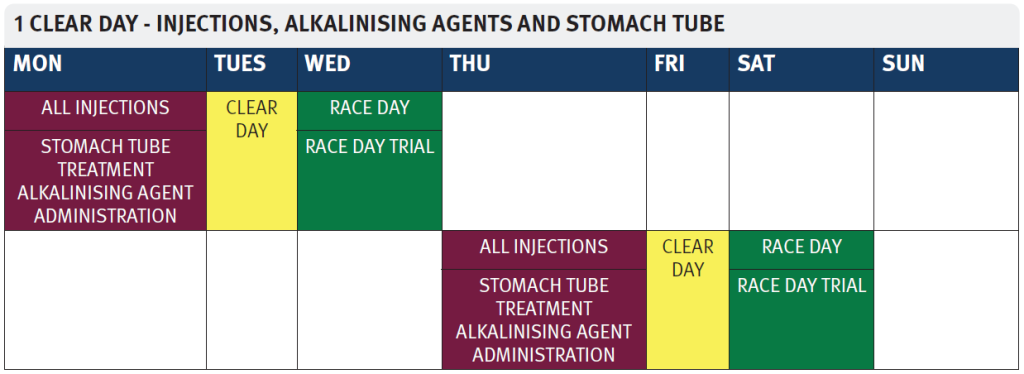Harness race day treatment guide
A fundamental principle of Australian racing is that horses must race free of the pharmacological
(or toxicological) effect of drugs or other substances.
To assist in maintaining these principles, under the rules it is not permitted to administer any medication to a horse on race day prior to running in a race.
Medication means any treatment with drugs or other substances.
As a general principle, any substance administered with the intent or hope of achieving a pharmacological/therapeutic effect will be considered a medication under the Rules.
Routes of administration of medication
Any substance administered to a horse on race day prior to racing by injection, stomach tube, paste, dose syringe, topical application or by inhalation, amongst any other routes of administration will be considered a medication.
Only normal feeding and supplementation according to the manufacturer’s recommendations for normal daily use that can be used by the horse voluntarily eating or drinking the feedstuff can be considered acceptable on race day.
Note: All injections and other methods of medication administration are subject to a rule not permitting their use within one clear day of racing.

Physical therapies
The following physical treatments are not permitted to be used at any time before racing on the day of racing:
• Acupuncture (including laser and infra-red treatment)
• Transcutaneous electrical nerve stimulation (TENS)
• Magnetic field therapy and any other forms of electrical stimulation
• Therapeutic ultrasound
Under the rules, Extra-Corporeal Shock Wave (ESWT) treatment can only be performed by a
qualified veterinary surgeon and is prohibited for seven (7) clear days prior to racing.

Alkalinising agents
Applying the definition of ‘one clear day’ rule makes it an offence to administer, attempt to administer or cause to be administered any substance that meets the definition within the rule of ‘alkalinising agent’.
Under the rules, an alkalinising agent is any substance that may elevate the plasma TCO2 of a horse, when administered by any route, with the exception of balanced, commercial electrolyte supplements which may contain some alkalinising agents, but which can be demonstrated to have negligible effects on plasma TCO2 when administered in feed according to the manufacturer’s recommendations for normal daily use.
Under the rules, any administration of alkalinising agents by any route within the one clear day of racing, including in the feed is prohibited.
Alkalinising agents that must not be administered either on the day of the race or within the one clear day of racing include, but are not limited to, bicarbonates, citrates, succinates, acetates proprionates, maleates, lactates and trometamol (THAM, tris buffer or trometamine) and also include products marketed as urinary alkalinisers and hind gut buffers.
Products that contain alkalinising agents and which fall within the definition include proprietary formulations such as: Sodium bicarbonate (bicarb), Baladene®, Langs solution® for intravenous use, Neutra-syrup®, Neutralka®, Neutrolene®, Neutrolene plus®, Neutradex and any other products that are marketed as lactic acid buffering or neutralising products.
These products must not be administered within one clear day prior to racing, or prior to competing in an official trial or jump out. Seek advice on products before administering.

Balanced electrolyte supplements and potassium supplements
Balanced electrolyte supplements and potassium supplements that contain electrolytes may be administered orally in normally recommended amounts within the one clear day but not on race day prior to racing.
Examples of normal balanced electrolyte products would include such proprietary preparations as Applyte Gel®, Electromix®, Electro Paste®, Electrovite Paste®, Endura-Max®, Endura-Max Paste®, Equicharge®, Horsport®, Humidimix®, Kelatolyte Electrolyte Replacer®,Ranvet Electrolytes®, Recharge®, Restore®, and Vetsense®.
Commercial electrolyte supplements which may contain some alkalinising agents but which should have negligible effects on plasma TCO2 when administered in feed. According to the manufacturers’ recommendations for normal daily use include Equilyte®,Race Electrolyte®, and Salkavite®.

Under the rules, intravenous solution must not be administered within one clear day prior
to racing. Commercial balanced intravenous solutions that can be used up to and including the day prior to an official trial include Darrow’s Solution®, Hartmann’s Solution® and Lactated Ringers.
Permitted on race day
Application of ice or cold water to musculoskeletal structures
The application of ice or chilled water, whirlpool boots or systems such as ‘Game Ready’ to musculoskeletal structures on the morning of the race day is permitted but is not permitted on the racecourse prior to a horse running in a race.

Application of hoof oils
The application of routine hoof oil is permitted on race day except if the product contains medications or herbs that claim therapeutic effects such as analgesia or anti-inflammatory actions.

Baby oil and petroleum jelly

Vibratory massage (e.g. equissage)
Vibratory massage systems may be used in the stable the morning of the race day but are not permitted on the racecourse.

Shampoos and fly sprays

Topical applications – Seek Permission
While topical applications are considered to be medications, circumstances may arise when a horse may suffer a minor injury, that does not affect its suitability to race but would benefit from the prophylactic application of a topical antibiotic or antiseptic.
In such circumstances, a trainer must apply to the Stewards for permission prior to the administration of the medication.
Clear day rule charts




Harness
The following orally administered substances are exempted substances and may be administered
up to but not including the day of a race: Antimicrobials (Antibiotics), but not procaine penicillin, Ranitidine (E.G. Ulcerguard®), Bromhexine, Dembrexine, Antiparasitics approved and registered for use in horses, Omeprazole (E.G. Gastrozol®, Omoguard®), Chondroitin Sulphate (E.G. Cosequin Equine®), Glucosamine (E.G. Joint Guard®)
This information should not be regarded as a substitute for comprehensive study of the rules.
If you are unsure, please contact the QRIC Stewards at stewards@qric.qld.gov.au